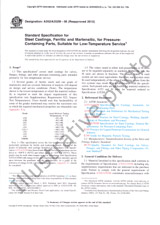We need your consent to use the individual data so that you can see information about your interests, among other things. Click "OK" to give your consent.
ASTM D4591-22
Standard Test Method for Determining Temperatures and Heats of Transitions of Fluoropolymers by Differential Scanning Calorimetry
Translate name
STANDARD published on 15.3.2022
The information about the standard:
Designation standards: ASTM D4591-22
Publication date standards: 15.3.2022
SKU: NS-1051689
The number of pages: 4
Approximate weight : 12 g (0.03 lbs)
Country: American technical standard
Category: Technical standards ASTM
The category - similar standards:
Annotation of standard text ASTM D4591-22 :
Keywords:
differential scanning calorimetry, DSC, fluoropolymer(s), heats of fusion, melting point, thermal analysis,, ICS Number Code 83.080.20 (Thermoplastic materials)
Additional information
| Significance and Use | ||||||||||||||||
|
4.1?DSC analysis may be used with fluoropolymers to achieve at least four different objectives as follows: 4.1.1?To measure transition temperatures to aid in the identification of the various fluoropolymers, individually or in mixtures; 4.1.2?To compare the relative levels of crystalline content of two or more specimens of a sample of a fluoropolymer relative to another sample by measuring the heat of fusion; Note 2:?Absolute values of crystalline content cannot be
determined until values for heats of fusion of the completely
crystalline polymers are available.
4.1.3?The heat of crystallization of pure PTFE homopolymer is depending on the relative molecular weight of the specimen. Some PTFE resins are modified with small amounts of comonomers. These modifications have profound effects on crystallization behavior and shall be considered when evaluating the results. 4.1.4?To characterize PTFE (DSC thermal curves determined on powders or products of PTFE that have never been melted convey appreciable information about details of morphology and molecular structure);4.1.5?To supplement the test for standard specific gravity (SSG) described in Specifications D4894 and D4895 by using the heat of crystallization of pure PTFE homopolymer, depending on the relative molecular weight of the specimen. The scopes of these specifications, however, include PTFE resins modified with small amounts of comonomers, and many commercial PTFE resins are modified in this manner. These modifications can have profound effects on crystallization behavior. Published relationships4 between heat of crystallization and molecular weight refer to pure PTFE homopolymers and, therefore, cannot be applied to the modified resins. |
||||||||||||||||
| 1. Scope | ||||||||||||||||
|
1.1?This test method defines conditions for the use of differential scanning calorimetry (DSC) with fluoropolymers. It covers the use of DSC analyses with the fluoropolymers, PTFE, PVDF, PCTFE, and PVF and their copolymers PFA, MFA, FEP, ECTFE, EFEP, VDF/HFP, VDF/TFE/HFP, VDF/CTFE. The test method is applicable to the analysis of powders as well as samples taken from semi-finished or finished products. The nature of fluoropolymers is such that special procedures are needed for running DSC analysis and interpreting the results. 1.2?The values stated in SI units as detailed in IEEE/ASTM SI-10 are to be regarded as the standard. 1.3?This standard does not purport to address all of the safety concerns, if any, associated with its use. It is the responsibility of the user of this standard to establish appropriate safety, health, and environmental practices and determine the applicability of regulatory limitations prior to use. Note 1:?There is currently no ISO standard that duplicates
this test method. ISO 20568-1 and ISO 20568-2 cover similar testing
and reference this test method for testing conditions.
1.4?This international standard was developed in accordance with internationally recognized principles on standardization established in the Decision on Principles for the Development of International Standards, Guides and Recommendations issued by the World Trade Organization Technical Barriers to Trade (TBT) Committee. |
||||||||||||||||
| 2. Referenced Documents | ||||||||||||||||
|
We recommend:
Technical standards updating
Do you want to make sure you use only the valid technical standards?
We can offer you a solution which will provide you a monthly overview concerning the updating of standards which you use.
Would you like to know more? Look at this page.




 Cookies
Cookies
